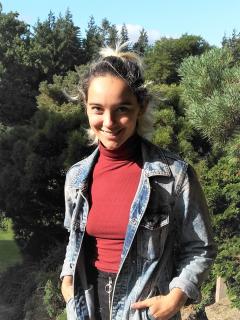Siena - MSc (Taught) in Classical Art and Archaeology
Siena, MSc in Classical Art and Archaeology, spent time working in archaeology and fresco conservation in Rome before coming to Edinburgh.
What attracted you to the University of Edinburgh and this programme, in particular?

What I love about the way that Edinburgh structures their Masters programs is the diversity in their courses. I found that a lot of other universities focus solely on preparing their students to go on to a PhD, whereas Edinburgh offers specialist courses such as Archaeological Illustration and GIS, which help prepare students for the possibility of going into commercial archaeology work as well.
Is there anything you wish you'd known or worried less about when preparing to start university?
I wish that I had known how many seminars and other opportunities there would be during the year. I think a lot of people worry about becoming “too specialized” going into their Masters, and these seminars provide a way to learn about new topics outside of your main field of research and coursework.
Do you have any advice for other students in their first week and beyond?
Get to know your professors and department! Take the extra second to drop an introductory email to your professors, or better yet, stop by their office to say hi. University is all about building your academic network, and these little steps really help you stand out from the crowd.
Budget! Save money! They aren’t kidding when they say that you won’t have time to work during your Masters, it really is full time. So be sure to have saved up enough money, or to have enough loans going into the school year. You will already have a lot of stresses about school work and research, and the last thing that you need is the additional stress of not having enough funds.
What was it about the research environment at Edinburgh that stood out to you?
I love the diversity of scholarship and coursework offered here. We have such a range in our professors’ interests, and I also found several who share my love of material culture. They are always available and happy to chat, and it fosters a very healthy working and learning environment.
What is the best thing about doing your MSc at Edinburgh so far?
I think that the best thing that I have gained from my experience at Edinburgh so far is a clearer idea of where I want to take my career, and what steps are necessary to achieve that. Of course, the seminars, conferences, and networking opportunities are also invaluable.
Do you have any plans after you graduate?
Going into this year I was very unclear on what I wanted to do after graduation, but already after just one month here I have quite a clear picture. I think that I would like to get involved in commercial archaeology here in Edinburgh. I love working in the dirt, and the active side of archaeology and field work, moreso than research. Through my time here I have already made some useful connections to pursue this, and have been in touch with several local companies. My MSc will help better prepare me for this career, and give me a strong launching pad for future work, independent research, and conference presentations.
...and finally, do you have any advice for anyone thinking of studying at the University of Edinburgh?
I would strongly suggest the University of Edinburgh to anyone interested, especially in the field of archaeology or classics. We have a wonderful community feeling here, and I would suggest that they get as involved as possible, whether that is being a program rep, school rep, attending conferences and seminars, or getting involved in societies. Edinburgh has a lot to offer, so don’t miss out!
I love the diversity of scholarship and coursework offered here. We have such a range in our professors’ interests, and I also found several who share my love of material culture.

